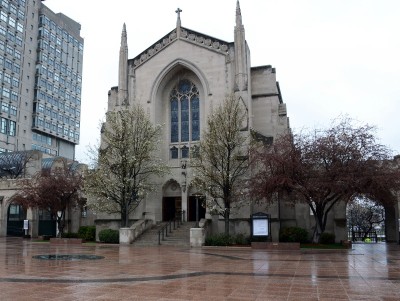
While a national survey released Friday by the Interfaith Youth Core found that students are not entirely satisfied about the level of religious diversity and support of expression on their campus, several student leaders of religious groups at Boston University said they don’t see a lack of diversity and support provided by the university.
The survey, entitled “Engaging Worldview: A Snapshot of Religious and Campus Climate,”sampled 38 colleges and universities nationwide over the course of three years to examine how the social and educational environments contribute to how students from different religious backgrounds feel about their experience on campus.
While 72 percent of students said the school population represents diverse religious reviews, only half were satisfied with the representation of multiple faiths on campus, and 42 percent felt either “moderately,” “slightly” or “not at all” safe about expressing their religious views in class, according to the report.
Alvi Rahman, president of the Islamic Society at Boston University, said the university and its students are supportive of religious practice and lifestyle choices.
“The majority of the BU community respects the multiple religious preferences on campuses whether it’s dietary preferences, prayers or personal choices,” said Rahman, a junior in the Sargent College of Health and Rehabilitation Sciences. “I have personally met many students who have been incredibly respectful and open to my lifestyle that includes no drinking for one example.”
Based on responses, the survey defined students identifying as Protestant, Orthodox or Roman Catholic as part of the worldview majority and those identifying as Jewish, Muslim and other religions as the worldview minority. Nonreligious students were also surveyed.
About 76 percent of worldview majority students said they had a space to practice their religion and a support system while 68 percent of worldview minority students agreed, according to the report.
BU’s Florence & Chafetz Hillel House is a place where Jewish students can practice and gather on campus, said Erin Miller, president of the Hillel Student Board.
“The purpose of the Hillel organization is to provide a Jewish community for students,” said Miller, a sophomore in the College of Arts and Sciences. “It [Hillel] does and it contributes to our relationship with the community, with the university, and how we feel accepted.”
Rahman said having designated places for the different religious groups on campus is one way that BU could better ensure that students feel free to practice their religion.
“If one were to look for a space for Hindus or Muslims, they would not be able to find one. For Muslims, we have a tiny space to pray in the George Sherman Union, but with such a large community here at BU, it is very difficult to use,” he said. “If we had a better space on campus, it would feel as if we are given some sort of acceptance.”
Miller said BU administrators should strive for a community that builds connections between different religious groups on campus.
“We get to make connections with people inside and outside of our faith,” Miller said. “It’s a way for people to express their spirituality socially, however they feel they want to connect, or not at all.”
Several students said BU is a safe place to express and practice their religion.
Dean Koester, a junior in the College of Engineering, said he identifies as an Atheist and does not feel bothered by other students about his beliefs. Although he is not part of a specific community, he said he is aware of them.
“I’ve never really connected with anything in religion,” he said. “I know there’s a whole community there, but I don’t feel like I connect with that. I feel there is self-segregation amongst each of the groups.”
Jill Rosati, a junior in the College of Fine Arts, said religious communities such as Hillel do a good job at getting students engaged and feeling welcome.
“If you’re involved in the religious community, then it’s prominent and important in your experience. You can make religion as big as you want at BU,” she said. “If you have a religion, you’re super accepted because you have a whole entire family.”























































































































